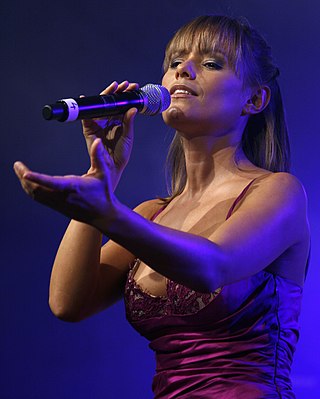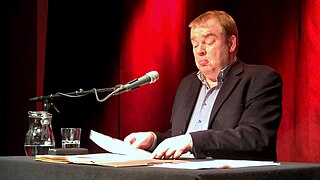
Francine Jordi is a Swiss pop singer.

Peter Schilling is a German synthpop musician whose songs often feature science-fiction themes like aliens, astronauts and catastrophes. He is best-known for his 1983 hit single "Major Tom " which was an international success.

Karl Gottfried Brunotte is a German composer and music philosopher, particularly noted for his contributions to church music.

Max Goldt is a German writer, columnist and musician.
Matthias Klemm is a German painter and graphic artist.
Before the Lightning Strikes is an East German comedy film directed by Richard Groschopp. It was released in 1959.

Günter Kochan was a German composer. He studied with Boris Blacher and was a master student for composition with Hanns Eisler. From 1967 until his retirement in 1991, he worked as professor for musical composition at the Hochschule für Musik "Hanns Eisler". He taught master classes in composition at the Academy of Music and the Academy of Arts, Berlin. He was also secretary of the Music Section of the Academy of Arts from 1972 to 1974 and vice-president of the Association of Composers and Musicologists of the GDR from 1977 to 1982. Kochan is one of eleven laureates to have been awarded the National Prize of the GDR four times. In addition, he received composition prizes in the US and Eastern Europe. He became internationally known in particular for his Symphonies as well as the cantata Die Asche von Birkenau (1965) and his Music for Orchestra No. 2 (1987). His versatile oeuvre included orchestral works, chamber music, choral works, mass songs and film music and is situated between socialist realism and avant-garde.
The GDR-open Chanson days Kloster Michaelstein had a meeting a majority of critical singer-songwriter and folklorist in Michaelstein Abbey, where "everyone was asked to sing his song."

Dieter Kalka is a German writer, songwriter, poet, dramatist, musician, editor, translator and speech therapist.
The Verlag Harri Deutsch with headquarters in Frankfurt am Main, Germany, as well as in Zürich and Thun, Switzerland, was a German publishing house founded in 1961 and closed in 2013.
The German national competition Bundeswettbewerb Gesang Berlin was inaugurated in 1966 as a competition for solo singing. Beginning in 1979, it has been held annually, for the categories Musical and Chanson in uneven years, for Opera, Operetta and concert singing in even years. The patron of the competition is the mayor of Berlin, where the competition is organized and held by the association Bundeswettbewerb Gesang Berlin.
Jürgen Hart was an East German music teacher who became a popular cabaret performer after his song, "Sing, mei Sachse, sing", became an overnight hit.

Roswitha Trexler is a German operatic soprano and mezzo-soprano who became internationally known especially as an interpreter of the music of Hans Eisler and for her commitment to avantgarde vocal music.

Doris Ziegler is a German painter whose work responded to and engaged with the Wende and the peaceful revolution in the GDR during the late 1980s.
Hella Maria Brock was a German music educator, musicologist, and an internationally known Edvard Grieg scholar. Brock was professor of music and English studies at the Leipzig University. She was president, and honorary president of the Grieg-Begegnungsstätte in Leipzig until her death in 2020.
Karl Ottomar Treibmann was a German composer and music educator. From 1981 until his retirement in 2001, he was professor of music theory and Tonsatz at the Leipzig University. He was one of the representatives of modernity in the German Democratic Republic, whose great major works can be found in the areas of opera, symphony and chamber music.

The Leipzig School is a movement of modern painting from the 1960s to 1980s, founded by painters who predominantly lived and worked in Leipzig, East Germany. The movement had its centre at the Hochschule für Grafik und Buchkunst, where several of the most prominent members were teachers. Some of their students, or students of students, became prominent and are referred to as the New Leipzig School.

Werner Heiduczek was a German writer. His works have been translated into more than 20 languages and name as author – depending on the language region – Verner Gajduček, Verners Heidučeks or Verneris Heidućekas.
Gerhard Friedrich "Gerd" Semmer was a German poet, columnist, songwriter and translator. He is considered the "father of the German protest song".
Edition Leipzig was a publisher in the German Democratic Republic (GDR/DDR), which, for the most part, placed books on Western markets as an export publisher. This was intended to serve representative purposes as well as to procure foreign currency. Today, the publishing house is part of the Seemann Henschel publishing group, which was taken over by Zweitausendeins in October 2017 with a program on regional and cultural history.









